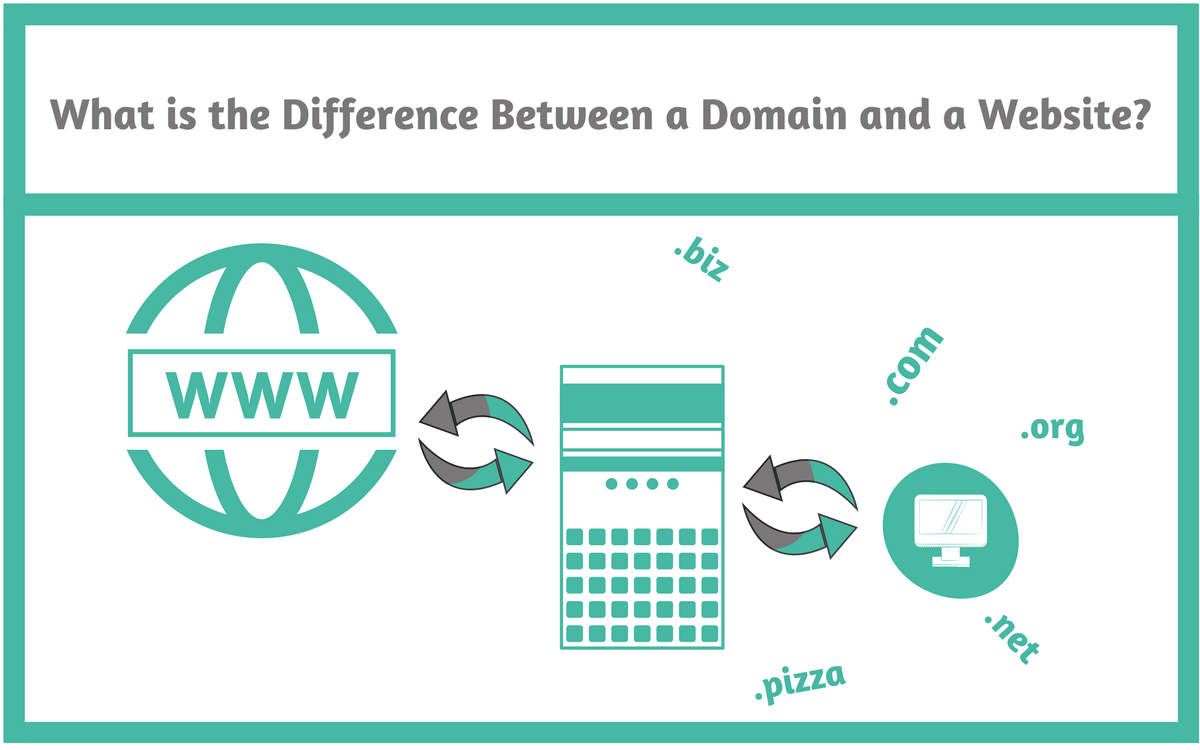For anything to be made available to your readers, you need both a domain and a website along with a web hosting provider. Each element is distinct and significant in its own right. Every new venture comes with the challenge of learning the lingo, and the online world is no exception.
So, let’s dive in and clarify these web terms, shall we?
What is a Domain or Domain Name?
You will hear the terms domain and domain name used interchangeably. I want to make sure you feel very comfortable with the concept because when you decide to build a website, a domain name is your first big decision. So, we’re going to talk about domains in detail.
The Internet is a vast place with over 1 billion websites. In that enormous sea of data, how will anyone find your website? Obviously, we need very precise addresses much like post office addresses that pinpoint specific homes and offices located thru out the world.
Each computer or device attached to the Internet has a unique locator called an IP (Internet Protocol) address. Think of a domain name as a human-friendly “nickname” for the IP address. A domain name is essentially a code that’s translated into the required IP address that differentiates the location of your website from every other site out there.
The beauty of the system is that domains are easily recognized and remembered by people where their IP counterparts are not. Here’s a quick example to hammer that point home.
IP Address = 209.191.122.70
Domain Name = Yahoo.com
Each of the above “addresses” points to the same location on the Internet. But just imagine having to remember the IP address of everything you want to visit (not to mention entering it correctly). I think we can all agree that wouldn’t work, right? 🙂
Domain Name Components
Every domain name has 2 components As an example, we’ll examine my domain name.
RetiredAndEarningOnline.com
The .com portion of the name is the Top Level Domain or TLD. You’ll also hear this called the extension or suffix. The first part of the name (RetiredAndEarningOnline ) is the second level domain or SLD. Uniqueness is assessed based on the full name including both components. Therefore, buying the same SLD with a different extension is often possible.
In the early days, TLDs were limited and usually took one of the following forms.
- .com
- .org
- .net
- .edu
- .gov
But those limitations no longer exist today. There are over 1,500 recognized extensions.
How Do You Get a Domain Name?
Domain names are registered with an organization called ICANN by going through a domain name registrar. Remember, it must be unique, so be sure to brainstorm several possibilities in case someone else already grabbed up your first few domain choices.
You register your domain name for a year, and you must renew the registration annually to retain it. There are many domain registrars to choose from such as GoDaddy or Namecheap. The cost of my domain is $13.99/year, so the cost is reasonable.
Ideally, your domain name is the name of your website, but that’s not an absolute requirement. Again, your domain name points to the location of your site but is distinct from the website itself. In fact, it’s possible to own a “parked domain” because you have not yet created your website.
What is a Website?
A website is a collection of related web pages or data files that visitors access with a browser. The data files may be some combination of text, graphic images, photos, video, animation or audio. The World Wide Web is a collection of all the publicly accessible websites.
Each website has a homepage which is typically the first page viewers see and where webmasters can communicate the purpose of the site. The rest of the content is then organized in a hierarchical directory structure but should be easy to access using navigation features like menu bars.
A website may have only a few pages, or it may contain thousands of pages. Every website must secure hosting because all those files have to be stored on a large computing device called a web server. Hosting companies also provide connectivity services.
For more information on web hosting providers, please read my prior post.
Domain vs. Website
Here’s a short video I’m sure you’ll enjoy that will reinforce our discussion even further.
Conclusion
I hope today’s post, what is the difference between a domain and a website, was helpful in clarifying terms that can sometimes seem confusing. Just to quickly summarize, a domain name enables readers to find your site while the website itself is what they see and interact with once they’ve arrived.
Are you eager to create a website of your own? Click the banner below to see how I started my site and received some excellent training for free!
Over to You
Please give me a shout in the comment section below with any remaining questions on domains, websites, or starting your own website. I love comments, and I promise to get right back to you!
Like It? Please Share It!



Linda,
This tutorial is extremely helpful for me, a new beginner at WA! Thanks for explaining TLD and SLD.
John W. Raleigh
Hi John,
You’re very welcome and I’m glad I could help.You’re launching a new website! That’s such an exciting time and I wish you the best. You’re going to love it! Thanks for stopping by my site!